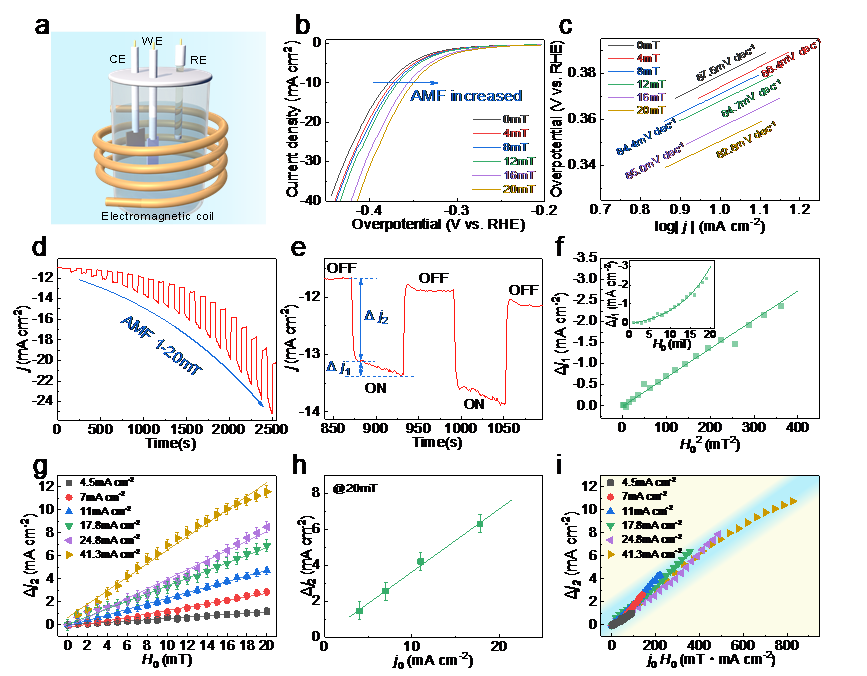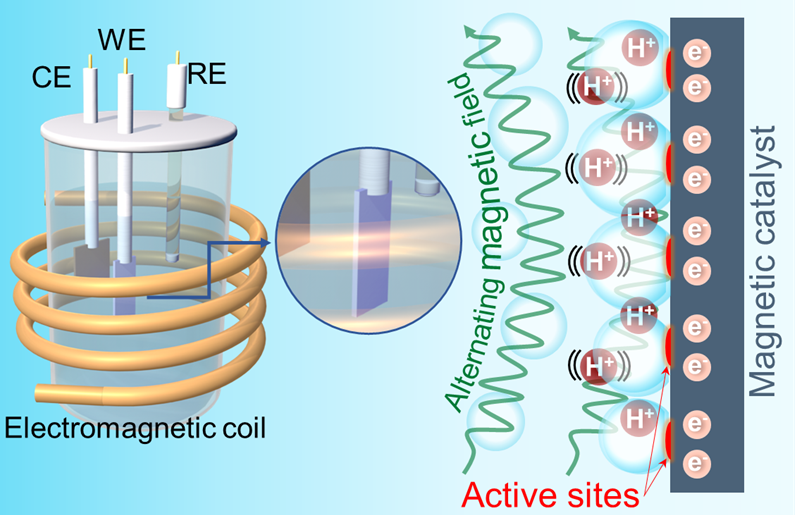As a clean energy source, hydrogen will play an important role in the future energy territory. Hydrogen production from water splitting are favored by people, because it has the advantages of lower cost, high efficiency, environmental friendliness and high safety, which is highly favored by people. The best solid-state catalysts for electrocatalytic hydrogen evolution reaction activity are the noble metals Pt, Pd, Ir and so on. However, noble metals are rare reserves, expensive, and unsuitable for large-scale production. Therefore, there is a need to develop cheap and efficient non-noble metal electrocatalysts for hydrogen evolution reaction. Catalysts containing magnetic elements such as Fe, Co and Ni exhibit excellent catalytic activity, stability and price advantages and are considered as one of the most promising catalysts to replace noble metals.
The Non-crystalline Function Materials Group, Ningbo Institute of Materials Technology and Engineering, Chinese Academy of Sciences, has been devoted to the development of new magnetic catalysts and performance optimization for a long time. A rapid preparation and screening method of multi-component magnetic catalysts based on magnetic elements such as Fe, Co and Ni was developed [ACS Catal. 2022 (12) 3789]. And developed a variety of magnetic catalysts with high activity [J. Mater. Chem. A 2020 (8) 3246; J. Alloy Compd. 2021 (880) 160548].
Recently, under the guidance of researchers Wang Junqiang and Huo Juntao, Cai Liang, a graduate student of the team, made important progress in enhancing the performance of electrocatalytic hydrogen evolution assisted by magnetic fields. In this research work, the influence of the applied alternating magnetic fields (AMFs) on the hydrogen evolution reaction (HER) of the Fe-Co-Ni-P-B magnetic catalyst and its microscopic mechanism were systematically studied. It was found that AMF can significantly improve the HER catalytic efficiency of magnetic catalysts, and its current density increases by 27% under an applied magnetic field of 20mT. The results show that the magnetic field enhances the HER catalytic performance mainly due to the Lorentz force improving the charge transfer efficiency, while the magnetocaloric effect contributes less. In addition, the high permeability of the Fe-Co-Ni-P-B electrode and the skin effect of electromagnetic eddy currents can further amplify the Lorentz effect. This work elucidates a new mechanism by which AMF enhances the HER activity of magnetic catalysts, and provides new ideas for further improving the performance of magnetic catalytic materials. The work was published in the internationally renowned journal ACS Appl. Mater. Interfaces 2022 (14) 15243, entitled "Key Role of Lorentz Excitation in the Electromagnetic-Enhanced Hydrogen Evolution Reaction" .

Fig. 1. The influence of alternating magnetic fields on the electrocatalytic performance of magnetic catalysts.

Fig. 2. Schematic illustration of the microscopic mechanism of the alternating magnetic fields in increasing the electrocatalytic performance of magnetic catalysts.
Above work support from the National Key R&D Program of China (2018YFA0703604 and 2018YFA0703602), National Natural Science Foundation of China (NSFC 51827801, 51922102, 52071327, and 92163108), Youth Innovation Promotion Association CAS (no. 2019296), and Zhejiang Provincial Natural Science Foundation of China (LR22E010004 and 2022C01023).

